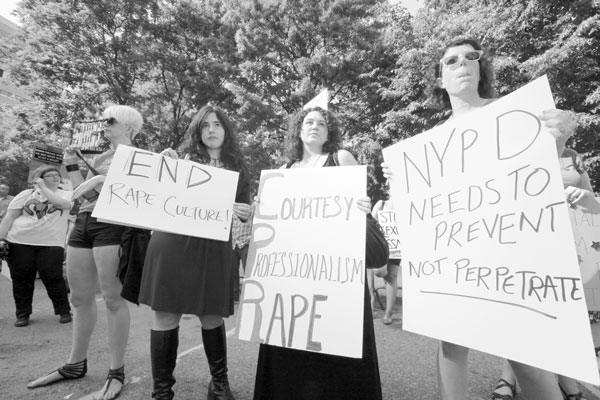
As a teenager, I remember listening, watching, and wondering about the outcome of the Rodney King criminal trial. When the jury acquitted three of the four Los Angeles Police Department officers, and couldn’t determine guilt or innocence of the fourth officer, I felt anger, loss, and hopelessness. The riots that ensued in the greater Los Angeles area, although horrific, seemed justified in my teenage mind. A black man, savagely beaten by four white officers, all caught on candid camera. An injustice unpunished.
Flash forward to 2009. Two then-New York Police Department (NYPD) police officers were called to assist a taxi cab driver with a drunk female passenger. The police officers assisted the female to her apartment, and then one of them allegedly raped her, while the other stood guard. Last week, a jury acquitted both police officers of sexual misconduct and falsifying business records. This verdict comes on the heels of the International Monetary Fund’s then-Director Dominique Strauss-Kahn’s arrest and arraignment of committing several sex crimes towards a hotel maid.
As a lawyer representing sexual assault survivors in civil legal court, I have profound respect for the theoretical implications bolstering the legal system. Yet, in practical terms, the justice system seems unfair in sexual assault cases where, unlike in other cases, victims are met with profound skepticism by the trier of fact. Indeed, as one juror mentioned after the NYPD trial, the need for physical evidence that a rape occurred – which isn’t necessary in all criminal cases to reach the government’s burden of “beyond a reasonable doubt” – is often the linchpin.
What makes the Rodney King trial and the NYPD Rape trial interesting is a common thread: both victims were highly intoxicated. With the NYPD Rape trial, the questions were always “where is the DNA,” and “how can we believe a woman who doesn’t remember.” With King, the looming question was “is this a just way to act.”
To me, these are strikingly different questions to crimes where police abuse and power had similar lasting physical and emotional effects on the victims and the community at-large..
The acquittal of abusing a man, turned into race riots. It became a symbol of those in power versus those not in power, abuse of authority, police brutality, and historical implications of slavery.
The acquittal of raping a woman turned into social networking outrage, with change.org petition, Twitter and Facebook posts, a protest in front of NYC’s courthouse, and an attitude that this is another trial added to the long master list where the victim’s credibility was questioned and then destroyed, with the perpetrator walking away with nothing but a bruised ego.
Although I condemn riots and strongly believe in non-violence, I ask, where is our, female, feminist King-like response to this trial? Where are the boycotts, the outward anger and rage? Where are the speeches, the opinion pieces, and the gobbling of media airtime?
More importantly, where are the leaders of this movement who are willing to step forward and say enough is enough already?
Like the King trial shaped my understanding of the world, I wonder if and how the NYPD Rape trial is shaping the views of our youth.
(Photo Credit: The Villager / Jefferson Siegel)